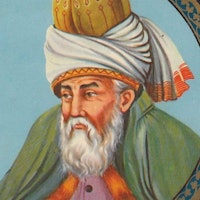The spiritually blind imagine things that only increase their suffering; the fancies of selflessness are what come to the eye of visionaries.
Jalaluddin Mevlana Rumi

The Pull of Reality
Topic: Serving Others
Reality is what grabs hold of you and pulls you away from mere things.
Reality is not what makes you blind and deaf and causes you to cling more tightly.
The spiritually blind imagine things that only increase their suffering; the fancies of selflessness are what come to the eye of visionaries.
Jalal ad-Din Muhammad Rumi, born on September 30, 1207, and also known as Jalaluddin Mevlana (Mawlānā) Rumi, J. M. Rumi, or simply as Rumi in the Western world, was an extraordinary poet, philosopher, and Sufi mystic. He was a prominent figure in the Islamic world, born in the region of present-day Afghanistan, then within the greater Persian Empire, and later settled in Konya, present-day Turkey. Rumi's passionate love for humanity and his deep spiritual insights transcended geographical, linguistic, and cultural barriers, making his poetry and teachings resonate not only within the Islamic world but also with audiences globally.
Rumi's spiritual journey led him to develop a unique approach to Sufism that emphasized love, tolerance, and the pursuit of enlightenment. He created a fusion of traditional Islamic beliefs with mysticism, nurturing a school of thought that flourished in his followers. They established a sect known to the Western world as the 'Whirling Dervishes', a term derived from their mesmerizing practice of whirling as a form of physical meditation. The proper name for this branch is the Mevlevi order, dedicated to preserving and promoting Rumi's teachings.
In addition to being a mystic, Rumi was an accomplished scholar and theologian who left behind an impressive literary legacy. His best-known work, the Mathnawi or Masnavi, is a six-volume poetic epic that explores themes of love, divine mystery, and human connection to the spiritual world. Rumi's poetic style is marked by profound emotion and philosophical depth, weaving metaphors and allegory to create timeless pieces that continue to inspire readers today. Rumi's influence reaches far beyond his time, as his teachings on love, compassion, and unity continue to touch the hearts of millions, transcending barriers of religion, culture, and era.
Mathnawi
Rumi, Jalaluddin Mevlana. The Rumi Daybook. Translated by Kabir Helminski and Camille Helminski, Shambhala Publications, Inc., 2012, p. 145. The Pull of Reality [Mathnawi 11:720-722].

Jalaluddin Mevlana Rumi
Theme: Serving

Jalaluddin Mevlana Rumi, Mathnawi 11:720-722 [Part 1 of Commentary]
Jalaluddin Mevlana Rumi’s quote, “The spiritually blind imagine things that only increase their suffering; the fancies of selflessness are what come to the eye of visionaries,” contrasts self-centeredness with selflessness. The “spiritually blind” are entangled in their egos and desires, creating a reality that heightens their suffering. Their focus on self-interest and material gains leads to discontent and isolation. In contrast, Rumi highlights the “fancies of selflessness,” where visionaries, through selflessness, gain a higher perspective and greater connection with others, fostering empathy and service.
Rumi further explains that reality pulls us away from superficial attachments. He asserts, “Reality is what grabs hold of you and pulls you away from mere things. Reality is not what makes you blind and deaf and causes you to cling more tightly.” Here, reality is an awakening force that detaches us from materialistic concerns. This awakening allows individuals to recognize the essence of their being, intertwined with the well-being of others. Letting go of material attachments opens us to authentic experiences and connections, the foundation of true service.
Rumi’s words remind us that genuine service stems from selflessness and spiritual clarity. Serving others without attachment to personal gain aligns us with a higher purpose and contributes to the collective good. This form of service benefits those we serve and transforms us, liberating us from the confines of our ego and opening our hearts to purpose and fulfillment. Service becomes a pathway to personal and communal growth, recognizing our interconnectedness.
Jalaluddin Mevlana Rumi, Mathnawi 11:720-722 [Part 2 of Commentary]
Rumi’s teachings encourage us to transcend limited perceptions and embrace a vision encompassing the well-being of all. Moving beyond the illusions created by self-interest, we can engage in acts of service that reflect our true nature and potential. This shift from self-centeredness to selflessness is not just a moral directive but a spiritual journey enhancing our understanding of reality and enriching our lives. Through selfless service, we alleviate others’ suffering and find deeper meaning and joy, embodying Rumi’s wisdom and compassion.
Additional Rumi Poems
Related Quotes
Copyright © 2017 – 2025 LuminaryQuotes.com About Us